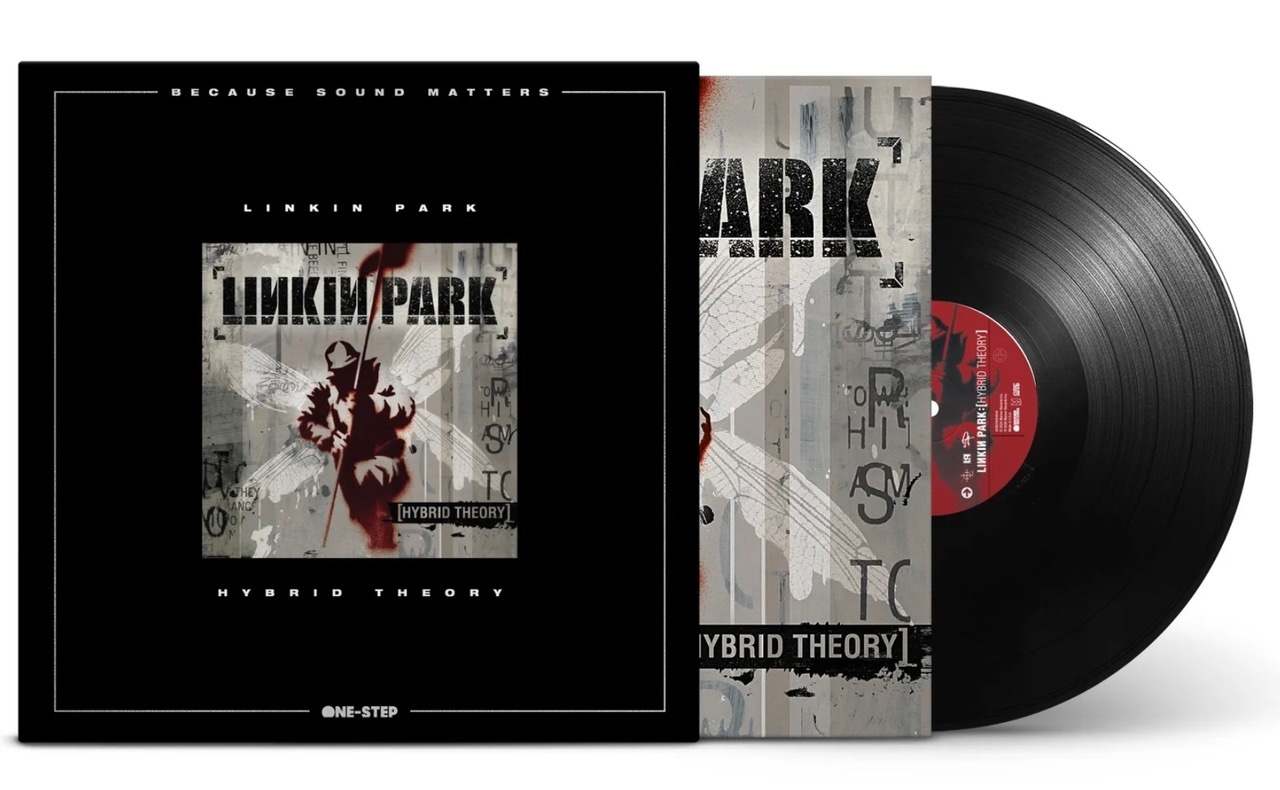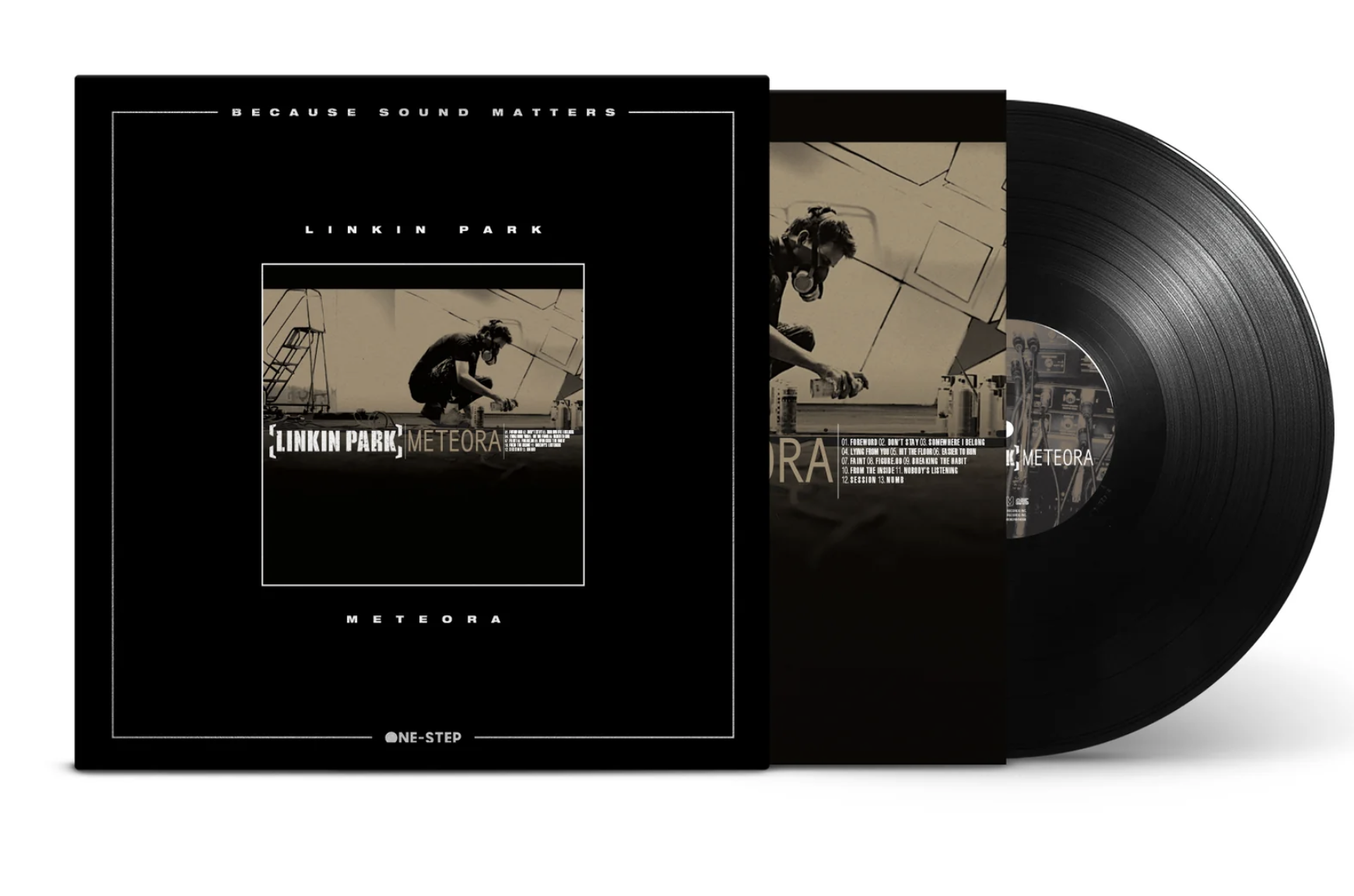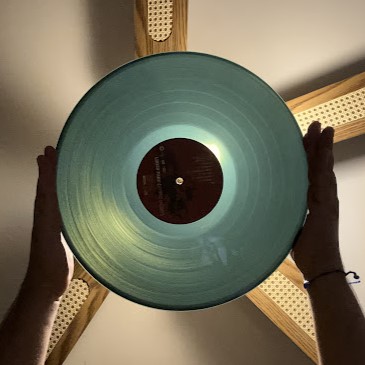Because Sound Matters - Hear Linkin Park As Never Before
Warner Records taps into the audiophile market
One-step vinyl pressings continue to fixate both self-described audiophiles and the uninitiated who are curious about the wonders of great sound. These pressings eliminate two of the three steps in traditional vinyl manufacturing (creating the father and mother), thus bringing out more detail from the source material and less surface noise. Audiophiles tend to agree that the results are sonically worth the added cost.
Warner Records' Because Sound Matters label joins the Concord Label Group's Craft Records and Mobile Fidelity Sound Labs on the one-step audiophile train. How smooth is the ride?
The Music
Hybrid Theory
 Produced by Don Gilmore
Produced by Don Gilmore
Engineered by Steve Sisco
Mixed by Andy Wallace
Source: 192/24 files from original master tapes
Rating: 10
Released at the turn of the millennium, Hybrid Theory was that time's most cutting-edge rock record. Linkin Park’s unique blend of nu-metal, rap, and alternative rock allowed them to exist on their plane and not come across as a second-rate Limp Bizkit. The band had their essence down to a winning formula that worked perfectly: Brad Delson’s crunchy guitars, Joe Hahn’s sampling/scratching, the impactful rhythm section of drummer Rob Bourdon and bassist Dave Farrell, Mike Shinoda’s rapping, and Chester Bennington’s passionate vocals. Tracks like “In The End,” “Crawling,” and “One Step Closer” exemplify the album’s central themes of personal struggles, drug addiction, and anger. Hybrid Theory’s success became the benchmark of Linkin Park’s success and is the band’s sole RIAA certified Diamond album.
Meteora
 Produced by Don Gilmore
Produced by Don Gilmore
Engineered by John Ewing, Jr.
Mixed by Andy Wallace
Rating: 10
Linkin Park reemerged in 2003 with their sophomore effort, Meteora. Stylistically, it continues the nu-metal/rap musings of its predecessor, Hybrid Theory. The rigors of the road, tightening the group and its expanded instrumental palette, resulting in an album that's a musical and sonic upgrade. Tracks like “Somewhere I Belong” and “Faint” welcome the listener to familiar territory, yet tracks like “Breaking the Habit” and “Faint” introduce more natural elements such as pianos and strings to Linkin Park’s sound. The angst dials back to allow for more melodic and personal moments to shine; it's the sign of a band maturing.
Minutes to Midnight
 Produced by Rick Rubin and Mike Shinoda
Produced by Rick Rubin and Mike Shinoda
Engineered by Andrew Scheps, Dana Nielsen, Ethan Mates
Mixed by Neal Avron
Source: 96/24 flat master files
Rating: 9
If critics were weary of Meteora's similarity to what came before, a curve ball came from Minutes to Midnight. Linkin Park deserves credit for knowing their classic sound exhausted itself before becoming redundant. Alternative rock was the flavor in the air, and the musical shift is evident on tracks like “What I’ve Done” and “Shadow of the Day.” Mike Shinoda remained in the driver’s seat as co-producer and co-writer, but his rapping abilities were limited to “Bleed It Out” and “Hands Held High”. It’s as if Linkin Park wanted to acknowledge the tentpoles of its sound, but each at its own wavelength, just like “Given Up” and “No More Sorrow” are exclusively metal songs. In retrospect, Minutes to Midnight best represents Linkin Park’s musical versatility.
The Presentation
Because Sound Matters combines elements of the original release with added enhancements to create a stunning physical product. The hardcover slipcases are classy, with a foil inlay and a scaled-down rendering of the album cover. Credit must be given to Warner Records and Because Sound Matter's Tom Biery for their transparency providing a specification breakdown on the back of the slipcase that includes the source material, vinyl compound, mastering engineer, pressing plant, etc. Upon close examination of the Stoughton tip-on jackets inside the slipcases, the faithfully replicated artwork on my standard pressings had more of a photo-like quality, with the One Steps having a somewhat darker contrast and slight pixelation; it is a forgivable issue, probably due to original artwork availability. Warner Records opted for Neotech’s high-grade VR900 vinyl compound, utilized in MoFi’s Ultradiscs and Craft Recordings’ Small Batches. Record Technology Incorporated (RTI) was/is a reputable force in the pressing industry, and it did a knock-out job with these pressings, weighing 180g and playing dead quiet.

The Sound
Hybrid Theory
Rating: 9
Produced by Don Gilmore
Engineered by Steve Sisco
Mixed by Andy Wallace
Reissue produced by Tom Biery
Mastering and Lacquer cutting by Levi Seitz
Source: 192/24 files from original master tapes
Before approaching the One Step, for reference purposes I I gave my EU reissue from 2014 cut by an in-house engineer at Optimal, a spin. Throughout the album’s heavy moments, the impact of the whole band comes across with a crunching vengeance. However, it sounded congested to the point where that power had some restraint, not to mention a lack of higher frequency emphasis. The One Step sounded as if a shield had been lifted from the music, resulting in a more pronounced bottom end particularly noticeable in how Rob Bourdon’s kick drum cuts through in the mix. Sonically, the One Step has everything going for it to render the 2014 pressing unlistenable. However, even with the total capacity of the music’s power unleashed, the congested quality of the 2014 pressing still found its way here. It is simply a fault of the final mix before any type of mastering could work wonders.
Meteora
Produced by Don Gilmore
Engineered by John Ewing, Jr.
Mixed by Andy Wallace
Reissue produced by Tom Biery
Mastering and Lacquer cutting by Levi Seitz
Source: 192/24 files from original master tapes
Rating: 10
This album proved to be a challenge. My 2014 reissue, cut by an in-house engineer at GZ Vinyl/Pirate Press, was spread across two LPs with plenty of groove space for each track to breathe. Here, the One Step compacted the album onto one LP. The two-LP 2014 sounded so vast and in-your-face. Production-wise, this album is spectacular without the drawbacks of its predecessor and breathes so much more. The single LP One Step had a more rounded bottom end and sounded, for lack of a better term, “slick.” The One Step magnifies every nuance of the recording and doesn’t come across as bombastic like the 2014 cut. It has distinctive attributes that make the listening experience different but doesn’t necessarily better or improve what came before. What matters most is that nothing was lost sonically, especially with the album packed into 1 LP.
Minutes to Midnight
Produced by Rick Rubin and Mike Shinoda
Engineered by Andrew Scheps, Dana Nielsen, Ethan Mates
Mixed by Neal Avron
Reissue produced by Tom Biery
Mastering and Lacquer cutting by Levi Seitz
Source: 96/24 flat master files
Rating: 10
The deadwax of the original pressing bear the etchings of the late great Stan Ricker and his half-speed mastering process. As much as he loved incorporating bass in his cuts, this pressing sounded anemic. Half-speed mastering may have its selling points, but the reality is that it often sacrifices bottom end transient clarity. Co-producer Rick Rubin can be a controversial figure in the production world, and some of the questionable EQ settings on the vocals and excessive use of compression tarnish the final recording. Once the One Step reached the turntable, my floor buzzed with bass, and the original's sonic flaws diminished. I was mesmerized by how three-dimensional the crescendo moments sounded during the album’s dynamic punctuations, particularly on the song “What I’ve Done.” The most engaging factor of this pressing is that it keeps the listener sonically on his or her toes. The album’s shapeshifting styles give each song a distinctive nature, the opposite of getting acquainted with one specific style for the entire album. Of the three One Steps, Minutes to Midnight is the most cinematic and exciting album to experience.
Conclusion
Lacquer-cutting credentials aside, Blackbelt Mastering’s Levi Seitz is a fan of the band, which allowed him to hone in on every nuance passionate listeners can wrap themselves around with these albums. Warner Records' choice of using Linkin Park’s first three albums for their one-step imprint is crucial for various reasons. It breaks the stigma of the usual contenders of deluxe vinyl reissues: jazz standards and classic rock staples. These pressings mark a new chapter for the audiophile market, where a younger demographic can appreciate modern albums in a deluxe fashion. Take an album like Kind of Blue and think of all remasterings we've lived to see. Does this mean we are entering a new era where albums of the past 20+ years are bound to be retrospectively appraised via reissues like this with more to follow? History has a funny way of repeating itself. For Linkin Park fans wanting the ultimate aural experience of these respective albums, the Because Sound Matters One Steps are the real deal.
(Editor's note: series producer Tom Biery was responsible for the Because Sound Matters mid 2000 series that included albums by Joni Mitchell, Dire Straits, James Taylor and Van Morrison)







































.png)








